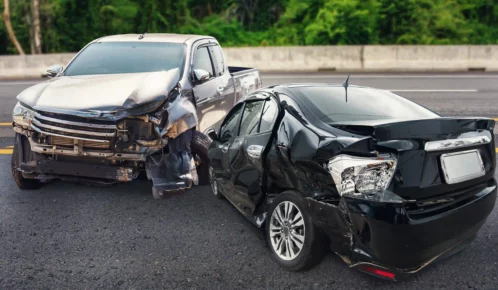A truck accident fuel spill in central Illinois resulted in the deaths of five people and significant damage. The accident, which occurred on U.S. 40 near Teutopolis, happened when another vehicle attempted to pass the chemical-laden tanker. The collision caused the truck to jackknife and spill about half of its 7,500-gallon load of caustic anhydrous ammonia, creating a dangerous plume.
Table of Contents

Emergency responders evacuated approximately 500 residents and worked overnight to contain the leak and mitigate hazardous conditions. The victims included three family members and two out-of-state motorists. Five others were airlifted to hospitals. The NTSB is investigating the incident, which disrupted the local community and traffic.
A hazmat response is necessary when a truck hauling fuels or other hazardous materials gets into an accident. This response involves taking measures to manage and remove toxic materials spilled during the accident.
A truck accident involving fuel spills requires a thorough investigation. The early involvement of a truck accident lawyer can have a positive impact on your claim. Your lawyer can look into the accident and analyze all evidence collected to identify all at-fault parties and fight for full compensation.
Call us at 312-600-0000 to book a free consultation if you have been in a truck accident. Our legal team at Ankin Law has success recovering compensation in truck accidents involving fuel and other hazardous materials spills.
What Is the Hazmat Response Process?
Hazmat stands for hazardous materials. It refers to substances or materials with safety, health, and property risks when hauled for commercial purposes. Responders must take steps to handle and eliminate hazardous materials if a truck accident occurs while transporting these substances. The key steps in the hazmat response process of a truck accident fuel spill are as follows:
Preliminary Evaluation and Planning
The first thing the responders do after arriving at the scene is to conduct a preliminary evaluation. This evaluation involves determining the scope of the spill, the type of fuel, and possible risks to health, property, and environment. The outcome of this evaluation informs the type of response needed, resources required, and protection methods for accessing the site. It also helps them determine evacuation requirements.
Building a Perimeter Around the Site
Safety is a priority during a hazmat response process. Responders must set up a perimeter around the scene of the incident. This perimeter keeps unauthorized persons from getting into the affected zone and ensures the safety of responders and nearby residents. It also prevents the spill from spreading further and enables responders to concentrate on containment and cleanup efforts.
Setting Up a Command Center
Effective communication and collaboration are essential for the success of a hazmat response process. As such, it is necessary to establish a command center near the affected area. This center is where response team leaders meet, review progress, make decisions, communicate with team members, and update relevant stakeholders.
Fuel Containment
Responders must use appropriate containment measures to keep as much of the spilled fuel as possible within the affected area. The objective is to keep the fuel from spreading to nearby areas and resulting in additional damage. Containment measures may include placing absorbent materials or sandbags around the incident area to keep the spill from spreading.
Recovery and Removal
Upon containing the spill, the hazmat responders embark on recovering and removing the fuel. They use fuel spill kits to collect and remove the spilled fuel from the site. They then put the recovered fuel in collection bags and transport them to suitable disposal facilities.
Cleanup Phase
Toxic residues that may pose serious human health and environmental risks remain in the affected area even after fuel recovery and removal. A rigorous cleanup is necessary to return the incident site to its pre-spill status. The cleanup procedure will depend on the type of fuel spill involved. Crude oil, diesel, and gasoline cleanup may include treating the soil and water within and around the affected area. It may also involve carefully collecting and disposing of contaminated substances.
What You Should Know About Truck Accident Fuel Spills in Chicago
More than 10,000 truck accidents happen in Illinois every year, causing disastrous consequences due to the huge size, weight, and impact force of these vehicles. Truck accidents involving fuel spills can result in life-threatening injuries, property damage, and loss of life. Health complications may develop over time due to exposure to harmful substances at the accident scene.
You may have the right to seek compensation for injuries and losses resulting from the accident. You may also sue for emotional distress if you are suffering from accident-related psychological effects like anxiety, stress, and depression. Wrongful death damages may be available if you lose a loved one because of the accident.
What to Do After a Truck Accident Fuel Spill
There are several steps you can take in the aftermath of a truck accident spill that will ensure the safety of not only yourself, but others as well.
Move to a Safe Spot and Call 911
The first thing to do is to move away from the fuel spill. Find out if the truck driver has any gas masks or hazmat suits. If so, put them on to prevent exposure to toxic fumes or sediments.
Call 911 to notify the authorities of the accident. Share useful details, including the number of people requiring medical assistance and the hazardous exposure you and others may have suffered.
When police and other emergency responders arrive, give a short and clear account of the accident. The goal is to avoid saying things that may imply liability or that the defendant may use to weaken your claim.
Remember to record the responding officer’s identifying information, such as name and badge number. You can then use this information for follow-up and to get a copy of the compiled police report.
Document the Crash Site
Take videos and pictures of the accident scene with your phone camera. Be sure to capture the area affected by the spilled fuel, damage to your car, torn or blood-stained clothes, and injuries sustained in the crash.
Exchange Information With the Truck Driver
Obtain the name, contact information, driver’s license number, and insurance policy details from the truck driver. You can also ask the driver for his or her employer’s name, if applicable. Illinois laws require you to give the other driver your information, including your name, phone number, and other relevant information.
Compile Witness Statements if Possible
Ask witnesses who seem cooperative to provide you with a written statement. Ensure each witness has signed and dated his or her statement. Alternatively, you can use your phone to take a video or audio clip of the witness giving an account of the accident.
You may be unable to obtain witness information and statements if you suffered serious injuries in the truck accident fuel spill. In that case, you may have to rely on witness statements in the police report.
Seek Medical Attention
Go to the hospital even if you believe you have not sustained any serious injuries. Some injuries may take longer to show symptoms. Also, health issues associated with toxic exposure may not be immediately obvious.
Let your treating doctor know you were in a truck accident involving a fuel spill. Inform the doctor about the hazard you may have been exposed to during the accident. This information will help your doctor carry out appropriate assessments and treatments. The medical professional will also state what caused your injuries in his or her notes and reports.
Hiring a Truck Accident Lawyer
Start working with a lawyer who has won many truck accident cases involving fuel spills. The effective guidance and representation of your personal injury lawyer can prove helpful in the numerous stages of the claim process, including:
Rigorous and Focused Investigation
Truck accidents involving hazardous substances may have multiple at-fault parties. So you may still obtain compensation, even if you played a role in causing the accident. A lawyer who understands contributory negligence in motor vehicle accidents can do a thorough investigation to determine who to sue and for how much. Your lawyer will personally investigate your accident and enlist the services of a private investigator if necessary
The investigation process may involve visiting the accident scene, obtaining surveillance camera footage, and researching the specific health risks posed by spilled fuel. It also includes interviewing witnesses, speaking with the officer who responded to the accident scene, and consulting with accident reconstruction engineers.
Handling Insurance Companies
Your lawyer will speak with the at-fault party’s insurer from the start. That way, you don’t have to worry about making a statement or engaging in actions that may hurt your claim. The lawyer will also handle the settlement negotiation on your behalf. The insurer is more likely to accept a settlement figure proposed by your lawyer to avoid a trial.
Representation in Court
Negotiations with trucking and insurance companies may sometimes fail to yield a satisfactory settlement. If that happens, your lawyer will file a lawsuit and make a convincing case for compensation before the judge or jury.
Contact us at Ankin Law if you have been injured in a truck accident fuel spill. Our truck accident lawyers have more than 100 years of experience in injury cases.



